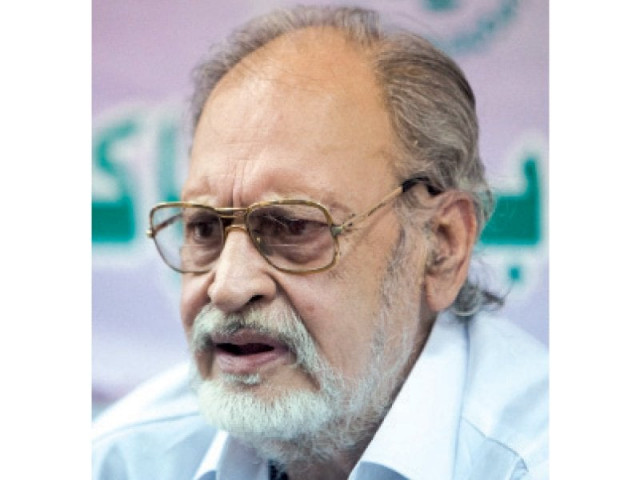Literary discourse: Rendezvous with Abdullah Hussain
The prolific Urdu novelist talks about his writing and life experiences.

“Literature has only one test of time — if you can survive three generations, you succeed,” says Abdullah Hussain.
After a hiatus of nearly two decades, the critically acclaimed Urdu novelist Abdullah Hussain made an appearance at the Pakistan Academy of Letters (PAL) on Tuesday.
This homecoming of sorts coincided with the silver jubilee of his debut Urdu novel, “Udaas Naslain”, which is set in pre-partition Punjab. It revolves around migration to Pakistan and the frustrations, dreams and aspirations of the lower-middle class in the newly-acquired abode. The book has also been dramatised by the British Broadcasting Corporation.
His second book, “Nadaan Log”, is a commentary on politicians, bureaucracy and the establishment. “Our government officials are not corrupt, they are incompetent and do not want to resolve issues,” he said. “Generals grow beards and join the Tablighi Jamaat and senior bureaucrats never retire; they find another post.”
The author, who has penned a number of short stories, is currently working on his third novel, “Azaad Log,” which deals with a generation of free-thinkers who dispel norms.
In the midst of sweltering heat, incessant power outages and poor sound equipment, Hussain managed to keep spirits high with his ready wit and good-natured humour. He talked about his time away in England and the significance of dedicated writing in solitude.
“Writing a novel is no easy feat, rather it is architecture. One lays brick upon brick to construct walls, support a roof and makes room for doors and windows. People can’t write novels these days because they lack the perseverance to do so,” he said.
Elaborating on his creative process, he said it takes him about four to five years to write a novel, on average. While the practice requires writing in isolation, one should not forego the mundane activities of going shopping or picking groceries, he added.
Urdu fiction writer Amjad Tufail dissected the intellectual depth and flow of Hussain’s work. He underlined themes of globalisation, colonisation and imperialism. Summarising the first two books, he talked about the struggles of first-generation immigrants and the markedly different perception of their successors.
Defence Analyst Ayesha Siddiqa stated that there was a need to celebrate writers like Hussain, who have stood the test of “mafias” within the sphere of Urdu literature, alluding to a bias towards Urdu-speaking authors. She lauded his experimental streak, citing his first book.
She spoke of a disconnect between upcoming writers and those in Hussain’s league, considering that only a limited number of Urdu novelists who have come of age have been invited to and highlighted at contemporary literature festivals.
Prominent among the audience were poet Kishwar Naheed, rights activist Tahira Abdullah and writer Agha Nasir.
In the question-and-answer session, an audience member likened his work to Quratulain Haider, whom the writer said he had great regard for. Another audience member, quoting T.S. Elliot, quipped, “good poets borrow, great poets steal.”
In his defense, Hussain said that literature was like a flowing river, where writers were continuously being inspired and influenced by other writers. “Literature has only one test of time — if you can survive three generations, you succeed,” he said. He received a standing ovation as the session concluded.
Published in The Express Tribune, June 12th, 2013.


















COMMENTS
Comments are moderated and generally will be posted if they are on-topic and not abusive.
For more information, please see our Comments FAQ